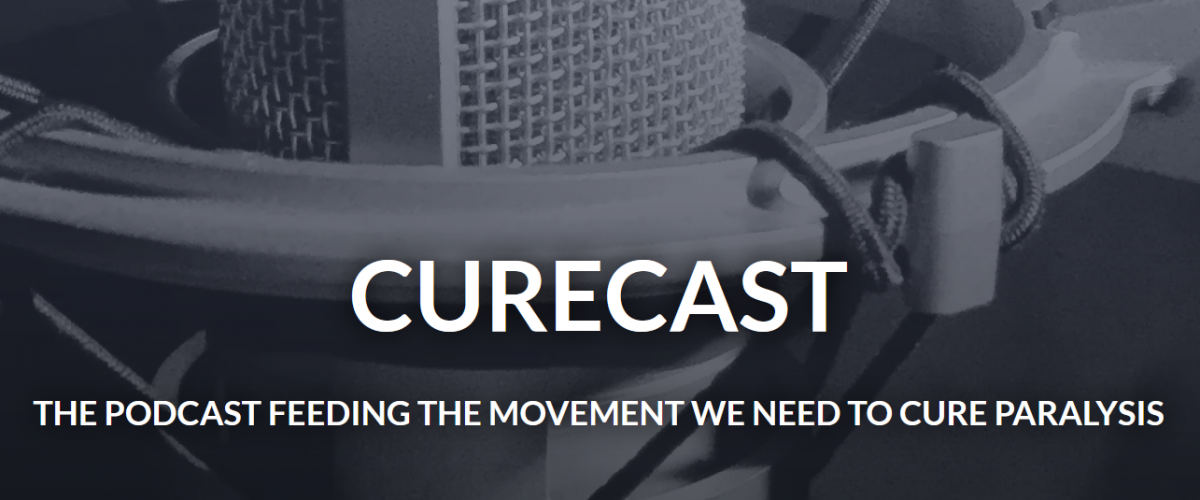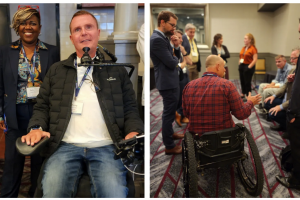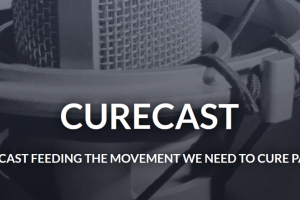Until recently, research priorities for spinal cord injury therapies were driven by people who knew little about living with the condition. Not any more.
(Minneapolis, MN) — September 5, 2023 — Kim Anderson brought the voice of people living with paralysis into the process of therapy development. People with lived experience are now helping define research priorities.
Anderson, a neuroscientist at MetroHealth Medical Center and Case Western Reserve University School of Medicine, describes her game-changing work on the latest CureCast Podcast, presented by Unite 2 Fight Paralysis (available on Apple, Spotify, Soundcloud).
As a scientist, Anderson has studied her own medical condition, cervical spinal cord injury (SCI). Earlier in her career she witnessed fellow researchers design and implement studies to address SCI, often assuming that her community’s highest priority was return of walking function. “That’s not the case,” she said, “but scientists had no idea of what we wanted – they didn’t ask and this important detail was never presented to them.”
Twenty years ago, Anderson flipped the script for SCI research by conducting a large survey of people living with paralysis. “I wondered why there wasn’t more research on cervical injury, and why so little on the things that were important to me, including bladder and bowel function, sexual function, or pain. Researchers would tell me, ‘I don’t see any data that those things are important.’ So I said, ‘OK, I’ll get your data.’”
Said CureCast host Jason Stoffer, who also lives with SCI and co-directs the U2FP Cure Advocacy Network, “Anderson’s 2004 paper, ‘Targeting recovery: priorities of the spinal cord-injured population,’ had a tremendous and lasting effect on the scientific community. It is still one of the most cited papers in all clinical spinal injury research. Kim confronted the disconnect that no one else saw – why don’t people who have the most to gain or lose from research get a voice in the process?”
The most important thing for people with cervical injury is hand and arm function, Anderson reported. For those with paraplegia, the top priorities included sexual function, bowel, bladder, and pain.
“Anderson’s survey results recalibrated the way scientists approached SCI,” said CureCast co-host Matthew Rodreick, executive director for U2FP. “She got the field to pose the question, ‘How is this work going to make any difference to a person with spinal cord injury?’”
While Anderson’s work helped shape research, she saw another critical gap: People living with injuries need to be considered research partners, not just patients. If there are risks or benefits, the community needs to be part of the discussion. So, in 2018, she brought together several spinal injury organizations, including U2FP, to create The North American Spinal Cord Injury Consortium (NASCIC).
As with NASCIC, U2FP amplifies the community voice in the research process. “We also advocate for the lived experience in the discovery process,” said Stoffer. “U2FP has a program we call Lab Rats that places people with SCI in research labs as consultants. It’s been a great success for the community members and for the scientists – they are reminded firsthand why they are doing this work.” NASCIC has recently created a Research Advocacy Course to train community members to join labs.
Anderson said there’s still a long way to go to include community voice in the research process, including having funding agencies such as the National Institutes of Health require research grantees to partner with people with lived experience. “We are the model for other conditions to include patient voice. It’s slow, but steady. The agency is seeing the benefits of having community input across the research spectrum. Our voice is being heard.”
About Unite 2 Fight Paralysis: Founded in 2005, U2FP is a nonprofit dedicated to unify and empower the international spinal cord injury community to cure paralysis through advocacy, education, and support for research. Contact Executive Director Matthew Rodreick for more information, matthewrodreick@u2fp.org





